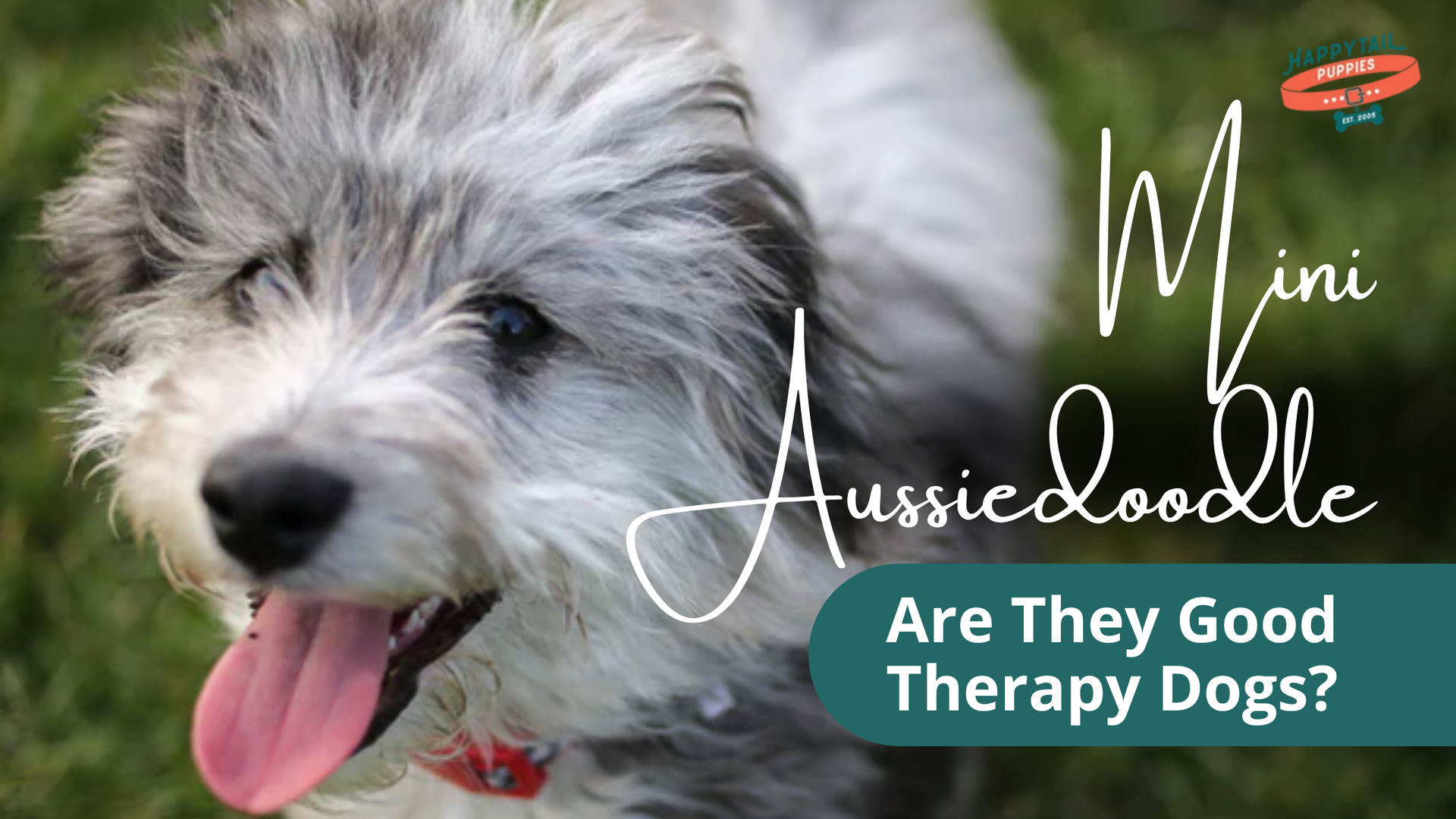Do Aussiedoodles Make Good Therapy Dogs?
Therapy dogs are special animals that are trained to help people in need and improve their emotional state, which refers to hospitalized patients, older adults in nursing homes, learners in learning institutions, among others, and members of society in their homes. Numerous breeds can be successfully utilized as therapy dogs; however, one of the relatively new and quickly becoming popular is the Aussiedoodle, which is a result of crossing the Australian Shepherd and the Poodle. In this blog, we will explain why a Miniature Aussiedoodle is great for being a therapy dog and in what way they can help people who need it.
Understanding the Aussiedoodle Breed
Aussiedoodle is a designer breed that is an offspring of the Australian Shepherd and Poodle, with qualities of both breeds being incorporated into the dog. They are available in different sizes depending on the utilization of Standard, miniature or toy poodle in the mating. The Australian doodles are playful, friendly, intelligent, and trainable dogs that could be suited to be therapy dogs.
Characteristics of Aussiedoodles
Intelligent and Trainable: The Australian Shepherd and Poodle are smart dogs and their puppies are alike in this aspect as well. One of the most important characteristics of therapy dogs is obedience, and, as was already mentioned, Aussiedoodles are intelligent breeds and good learners. They are highly intelligent and can follow complicated instructions with little to no elaboration, which is a great advantage of the breed.
Friendly and Social: Aussiedoodles are socialized and require the companionship of men to stay healthy and happy. Due to being social animals, they are ideal partners for people in need of companionship and affection. They depend on people’s company and may develop close relationships with them irrespective of the children or their aged.
Low-Shedding Coats: Owing to the poodle gene, Aussiedoodles often do not shed their coats much and are, hence, ideal for families with people with skin conditions. Hypoallergenic character of Aussiedoodles enables them to be present with people with tender skin without causing an allergic reaction, especially in places like hospitals and Homes for the Aged.

Why Aussiedoodles Excel as Therapy Dogs
Aussiedoodles possess several qualities that make them particularly suitable for carrying out therapy duties. Temperamental, intelligent, and adaptable, they can offer proper emotional support.
Temperament and Personality
Aussiedoodles are very friendly pets and are known to be very caring. They are genetically predisposed to developing close, endearing relationships with their owners and love being around people. This affectionate temperament qualifies them for therapy dogs because most people in need of help need both companionship and a human touch. It is an advantage to have a pet because they can feel and address human emotions when they are around us.
Intelligence and Trainability
The intelligence of Aussiedoodles helps the dog to learn the different breeds' commands and hand signals easily and also to change depending on some circumstances. This trainability is necessary for the therapy dogs because they have to respond to calls and act professionally depending on the place they are in. They are good learners and can be trained to perform tasks for the assistance of human beings; obedience training is easy in Aussiedoodles. The learning index shows that they are fast learners, a fact that means they can be trained effectively and are, therefore, fit for therapy work much more than other breeds in this bracket.
Adaptability
These friendly dogs can adapt well to any environment in and around the house. It does not matter if it is a calm nursing home, an active hospital, or a school with many children; Aussiedoodles can work in any environment and stay constant. They do not allow situations to get the best of them, thus making them good Therapy dogs. This flexibility keeps them in a position to deal with trials and tribulations that may come their way, especially when practicing therapy.
Non-Aggressive Nature
Aussiedoodles are non-aggressive, which is vital for therapy dogs. However, their state of mind is friendly and nonviolent, so they can handle and be around people, especially children and older people, without endangering them. This makes passersby feel more comfortable when interacting with them, which makes them feel safer and trust the establishment.
Empathy and Sensitivity
Some of Aussiedoodles's features include the power to pick the mood of the people surrounding them; they are empathetic. This empowers them to handle appropriately those who are sad, worried, and stressed because they will know how to calm them. In this regard, they have the understanding that comes with the intellectual capacity, which allows them to welcome patients' social support as needed.
Playful Yet Calm
Thus, Aussiedoodles are playful and energetic, but they can also stay still and laid back if necessary. This combination of fun and relaxation allows them to be splendid therapy dogs that can play with children or even rest at the side of someone who needs their company but does not play. They are versatile and effective therapy friends due to their capacity to change their behavior in accordance with certain circumstances.
Strong Bonding Ability
Due to their interbreeding with social Australian shepherds, Aussiedoodles are very affectionate towards their owners and other people. This strong bond makes them more effective therapy animals because those they visit can feel safe with them. Since they are closely bonded with their handlers, they will constantly stick to them to attend to their therapy duties.
The Impact of Aussiedoodles as Therapy Dogs
The Aussiedoodle breed has the possibility for major potential in the therapy dog realm. Due to their loving nature, intelligence, and adaptability, they can be considered as rather a valuable source of help for all those who need someone to turn to emotionally. No matter whether they accompany their masters to hospitals where the patients clearly need company and an uplifting mood, help in schools with children who need special attending, or spend time with the nursing home inhabitants, Aussiedoodles can help change the day and lives of the ones they meet.
Conclusion
Aussiedoodles have the perfect traits for therapy dogs in every sense of the word. They are friendly and affectionate, intelligent and flexible, and can, therefore, work in any environment, helping people emotionally. Effectively training an Aussiedoodle for therapy work is not an easy task, but it is definitely worth the effort since they have great potential to make people’s lives better. Aussiedoodles, irrespective of where you live in a hospital, school, home, or nursing home, are capable of softening the lives of the people around them as therapy dogs.
Frequently Asked Questions
Here are a couple of commonly asked questions we have answered for you.
What Are the Benefits of an Aussiedoodle?
Due to the breed's lineage, they are mostly service, comfort, and therapy dogs or simply irresistible family pets. They have a lot of energy and enjoy running, so they are good at dog sports, such as agility, rally, and flyball.
At What Age Do Aussiedoodles Calm Down?
But they have a slight problem when it comes to maturity. While they are intellectually developed, they are slightly behind in the emotional maturity department. Mini Aussies are mentally developed at the age of 2-3.
Do Aussiedoodles Have High Anxiety?
They want their family within reach all of the time. Another thing related to the character that Australian shepherds consider their common trait is the occurrence of separation anxiety in the breed, which Aussiedoodles can also experience.
What Are the Behavior Issues with Aussiedoodles?
When these hardworking breeds are combined, you get one high-energy, highly intelligent dog that has to keep its mind stimulated. Those who are not provided with some form of stimulation may end up causing havoc.
Do Aussiedoodles Bark a Lot?
More specifically, out of all the Aussiedoodles' lively traits, they are low barkers. Thus, Aussiedoodles are moderate barkers rather than loud or excessive barkers regarding many breeds.
- Mini Aussiedoodle


